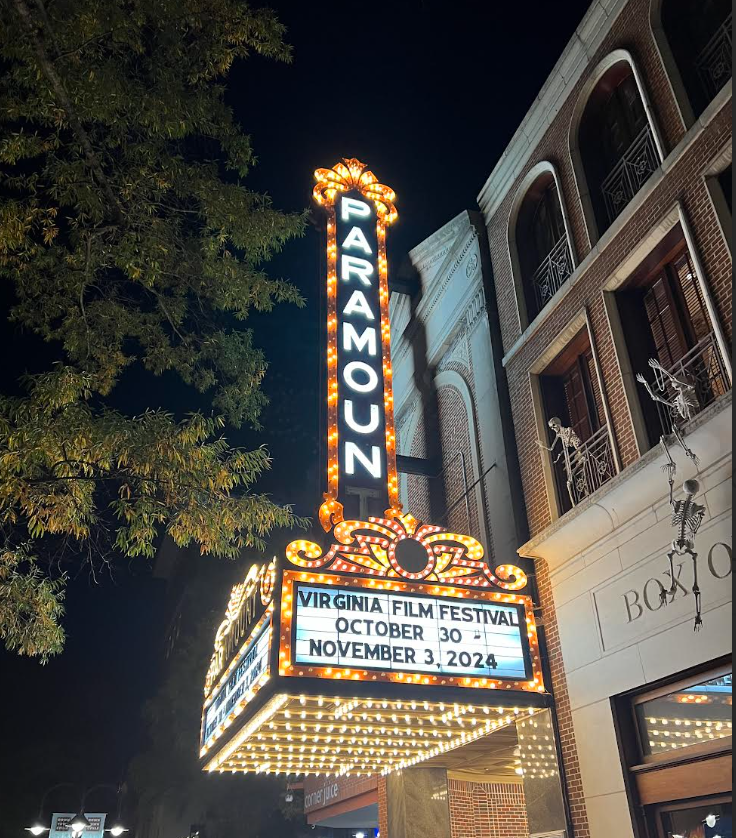Steve McQueen’s Blitz begins by bursting into flames. In the first scene, you are taken directly into London, 1940, as a hapless crew tries to extinguish a house fire with a runaway firehose. Blitz takes its name from the German word “Blitzkrieg,” meaning “lightning war.” Only the lightning that fell from the skies over London during World War II did so in the form of incendiary bombs dropped by Nazi bombardiers. As we see the bombs descend, the image changes from realistic to straight bolts of light to something akin to Pollack-like confetti until all that’s left on the screen is a massive row of daisies. I’ve heard some say that McQueen’s new film is surprisingly conventional. If that is true, it is only by McQueen’s lofty standards.
It has been six long years since McQueen made a feature-length film, 2018’s Widows, a heist film that played within the genre but elevated it at the same time. If one wants to argue that his three previous films, 12 Years a Slave, Shame, and Hunger, were more avant-garde than Widows and Blitz, I’ll accept that argument. But to suggest that Blitz is in any way a generic World War II film is not a position I can accept. The roots of what makes Blitz unique (outside of McQueen’s superior skill set) can be found in his groundbreaking Amazon series Small Axe, which filled the space between Widows and Blitz. Small Axe focused on the experiences of West Indian immigrants in post-war London.
If you think of any World War II movie made about the plight of those living in England during Hitler’s all-out assault, you’d be hard-pressed to come up with even one that had persons (even a single person) of color in it. At first, it’s a shock to see Saoirse Ronan’s dutiful mother and her sweet grandfather (played by the great musician Paul Weller) living in a row of houses with a young boy of color. That boy is their son and grandson, respectively. For reasons best left unexplained, the father is not in the picture. I’m sure some might see this film as a wokeified version of history, but the truth is, London was not merely a sea of white people during the war. McQueen’s film is keenly interested in correcting that misconception while telling the story of a mother and her son separated during the war and trying to find their way back to each other.

A film about the Nazi Blitzkrieg could have been told in numerous ways that might have been satisfying or even rousing, if unsurprising. McQueen’s telling makes a statement on immigration, racism, and opportunism. In far too many films about “the Great War,” people are shown as being at their best and coming together for a common cause. While there is some of that perspective of British resilience in Blitz, McQueen also shows us the dark underbelly of how people behave when they know they could die at any minute. As her son (the wonderfully emotive Elliott Heffernan in his film debut) tries to find his way home, his quest is just short of The Odyssey. He encounters a kind nightwatchman from the Gold Coast of Africa, a seemingly kind woman who trades him in as child labor to a group of Brits who break into partially destroyed jewelry stores to steal their wares and cut rings off the fingers of the dead. He survives an underground train station flood. He walks miles upon miles through wreckage and horror in the hopes of returning to the house he shares with his mum, granddad, and cat.
From the moment the boy leaps from a moving train that his mother has put him on with other children to keep them safe from the bombing, Blitz moves at breakneck speed. One stunning sequence follows another. There is an extraordinary setpiece of a jazz band (made up entirely of Black people) performing with such style and vigor that you’d almost think a scene from Francis Ford Coppola’s The Cotton Club was inserted into the film. It’s a joyful moment that would fit in any ‘40s musical (if Cab Calloway were alive and young, he would have surely played the hot-stepping band conductor), but then a siren wails, and the band and all of their well-heeled white patrons look up to the roof of their establishment. Nazi bombs did not discriminate, but notably, at a time when we have been routinely told that London and England at large were wholly united, the people of that country did have time to discriminate against “the other.”
With Blitz, which runs 120 minutes (but feels more like 90), McQueen has made a World War II film about the Allies unlike any I have ever seen. For the better part of two hours, we are shown fear, desperation, and only the occasional “stiff upper lip” that Brits are known for. Blitz may go backward in time, but this story of survival speaks to the present. There may be no Hitler (although more than a few aspiring world leaders are espousing fascist ideas), and the world may not be at war…yet, but the white fear of immigration is a very current affair in the UK and the USA.
McQueen’s Blitz is a film that only he could have conceived of, let alone made. Blitz is like a stiff drink served over and over again at a relentless pace. The buzz on the film coming out of the festival season is that it’s no Oscar contender. Fine. I’ll bet on Blitz outlasting many of the films that make the Academy-chosen Best Picture list. History will be kind to Blitz even if Blitz isn’t all that kind to “conventional” history.
Blitz will premiere on Apple TV on November 22nd








![We Could Go See BOOP! And Predict the Tony Awards! [PODCAST]](https://thecontending.com/wp-content/uploads/2025/06/tonys-120x86.png)
